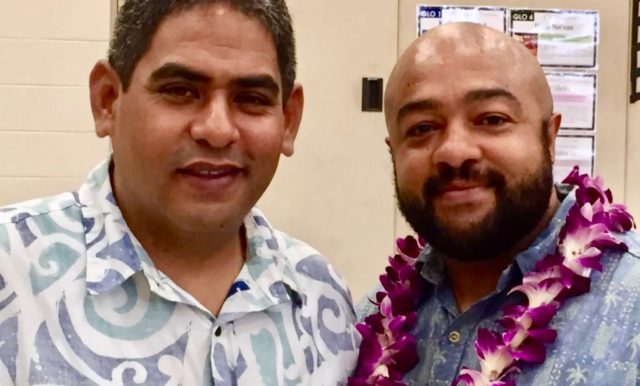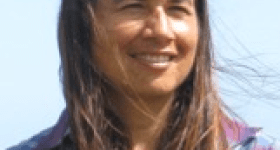Pictured on this page are Napoleon Kaʻiliawa and Albert Scales. These two guys are my heroes. Why are they heroes? Because they worked together to make their community healthier, more resilient and caring.
Napoleon Kaʻiliawa is the cafeteria manager at Keaau High School, and Albert Scales is Napoleonʻs “big boss,” the director of the School Food Service Branch of Hawaiiʻs Department of Education.
What are they doing? They are bringing locally grown products into the school lunch menu. They are helping kids to eat healthier foods like local fruits, vegetables and meat and supporting local farmers and ranchers. This in turn makes for a more resilient community.
How did they do it? By working together for the good of the whole; by being two leaders in a network of people that made positive change happen.

It took a group of people believing in each other to make this happen. With so much going “wrong” in the world, it’s easy to overlook all of the ordinary folks who are keeping the good and necessary but not very glamorous institutions — like public schools — going. But they’re not just keeping them going, they are patiently and persistently working to make their corner of the world a little bit better.
And these guys, by doing what they do, are making new stories — stories about heroes whose superpowers are caring and nurturing their community — rather than exploiting and destroying it, as so many big businesses and celebrated CEOs do. These are the heroes of peace and service, rather than the heroes of war and competition.
At First, Cynical
I did not expect to run into heroes when I went to the Farm-to-School kick-off event that Napoleon had organized. In fact, and Iʻm really ashamed about this, I didn’t return Napoleon’s call the first time he rang me up about wanting to get locally grown beef.
I was cynical. I didn’t believe in him. In my defense, I have been hearing about the Department of Education wanting to do this for years and it never quite gets done.
But it got done. And it’s because of Napoleon’s quiet efforts that it got done. He cares so much about getting healthy, fresh, tasty meals to the kids and he has the character and courage to ask other people to care, too.
For instance when he started coordinating the food service a few years ago only 35 percent of the students ate lunch at the cafeteria, despite the fact that lunches are free because of the high level of poverty in the school’s service area. Now 85 percent of the students eat lunch at school.
The best kind of leader takes all of the blame and gives away all the credit, and this is a great example of that kind of leadership.
How has he done this? Because he thinks deeply and creatively about serving the students. He thinks about the cultural food preferences of recent immigrants, such as the Marshallese islanders. They prefer to eat bananas green rather than ripe, so he ordered green bananas for them.
He adapts traditional Hawaiian and Filipino dishes so that they will fit USDA food guidelines.
What motivates him is knowing that “for some of these kids lunch at school is going to be the only healthy meal they get, because their parents are working too many jobs to make home-cooked meals for them.”
And Napoleon makes sure that the food tastes good, by pulling aside focus groups of students and adults to taste-test new menu items. The principal of the high school, Dean Cevellos, another key supporter of the Farm-to-School program says, “This is how much my chef cares: We have students that can only eat pureed foods because of their disabilities. He makes sure the cafeteria staff taste every batch before they send it out.”

Albert Scales is a hero in another way. He says, “All I did was let Napoleon go. He knew what he wanted to do. He’s spent years thinking about this. IĘ»m probably going to get in trouble for this later, but we got it done.”
The best kind of leader takes all of the blame and gives away all the credit, and this is a great example of that kind of leadership. The truth is that it takes courage and judgment to be an effective administrator.
Closing The Circle
Big public institutions like the Department of Education have a dead weight of rules and procedures that too often stifle attempts at change. Institutional turf wars can be brutal. Political support for new ideas can be fickle.
The work of aligning multiple levels of bureaucracy and political alliances takes very particular skills and experience. And then the courage to trust, to let out the reins, to believe in each other, to not be cynical.
What moved me was that everyone understood that this was about building relationships as much as anything — about rebuilding caring, vital relationship between the students and their families through the school through the farmers back to the land.
This was about closing the circle and supporting each other in a community. This was about farmers being able to feed the students and students seeing that their food comes from their neighborhood and their neighbors.
It was also about a group of people working together to change a system based on the kind of world they want to see. That’s a pretty amazing thing to experience.
 GET IN-DEPTH
REPORTING ON HAWAII’S BIGGEST ISSUES
GET IN-DEPTH
REPORTING ON HAWAII’S BIGGEST ISSUES
Community Voices aims to encourage broad discussion on many topics of community interest. It’s kind of a cross between Letters to the Editor and op-eds. This is your space to talk about important issues or interesting people who are making a difference in our world. Column lengths should be no more than 800 words and we need a current photo of the author and a bio. We welcome video commentary and other multimedia formats. Send to news@civilbeat.org. The opinions and information expressed in Community Voices are solely those of the authors and not Civil Beat.
We need your help.
Unfortunately, being named a finalist for a Pulitzer prize doesn’t make us immune to financial pressures. The fact is, our revenue hasn’t kept pace with our need to grow,Ěý.
Civil Beat is a nonprofit, reader-supported newsroom based in ±á˛ą·É˛ąľ±Ę»ľ±. We’re looking to build a more resilient, diverse and deeply impactful media landscape, and we hope you’ll help by .



